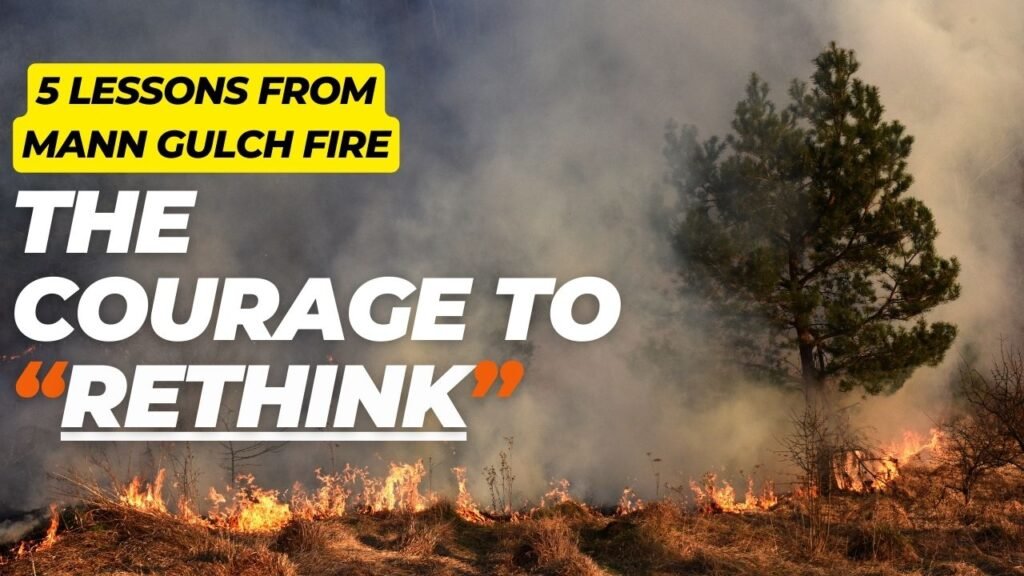It was a scorching summer day in Montana, in the year 1949. The air was thick with smoke, and the crackle of flames echoed through a narrow gulch. Fifteen brave young men parachuted from the sky, ready to battle a wildfire. Little did they know, they were about to face a tragedy that would change firefighting forever and teach invaluable lessons about decision-making under pressure.
Yes, this is the story of the Mann Gulch fire, an event that claimed the lives of 13 firefighters.
The Situation
Imagine yourself in the shoes of those smokejumpers. They had been trained for this, they knew all the protocols, and were super confident in their abilities. But as they approached the fire, something unexpected happened. The wind shifted, and suddenly, the inferno raced toward them, cutting off their escape route.
Wagner Dodge & his Eureka moment
In this moment of terror, the crew’s foreman, Wagner Dodge, had a flash of inspiration. He did something that went against everything these men had been taught. He lit a small fire in front of him and ordered his team to lie down in the burned area.
The Decision moment
Now, imagine the conflicting thoughts that must have been raging in the minds of Dodge’s team members. Their training had taught them to run. Every instinct screamed at them to flee uphill. But their leader was telling them to do something that seemed utterly insane – to lie down in front of the approaching inferno.
The Outcome
Tragically, most of Dodge’s team couldn’t break free from their training. They tried to outrun the fire instead. Only Dodge and two others who found a different escape route survived. This is, what psychologists call the “First Instinct Fallacy” – our tendency to stick to initial thoughts or learned responses, even when the situation demands a completely new approach.
What relevance does it hold today?
At the back of your mind you must be thinking, “It is a terrible tragedy, but what have I got to do with a 75-year-old wildfire, and how does it affect my life?” The answer is everything. How often have you clung to your first idea in a meeting, even when new information suggested a better path? How many times have you rejected an unconventional solution because it didn’t fit your preconceived notions?
In our rapidly changing world, the ability to rethink and unlearn is becoming more crucial than ever. It’s not just about firefighting – it’s about business, technology, relationships, and personal growth. So how do we develop this mental agility? How do we avoid falling into the trap of rigid thinking?
- Intellectual Humility: First, cultivate intellectual humility. Recognize that your knowledge has limits. Your first instinct isn’t always your best instinct. Remember, even experts can be wrong. Wagner Dodge, an experienced firefighter, had the humility to realize that standard procedures wouldn’t work in this extraordinary situation and he took a corrective action that ended up saving his life.
- Your initial thoughts are Hypothesis: Second, adopt a scientific mindset. Treat your initial thoughts as hypotheses to be tested, not truths to be defended. Be open to new data, willing to revise your beliefs when faced with compelling evidence. Dodge didn’t just stick to what he knew – he observed, analysed, and came up with an innovative solution on the spot.
- Diverse Perspectives: Third, surround yourself with diverse perspectives. Create what Adam Grant calls a “challenge network” – a group of people who can offer different viewpoints and question your assumptions. Always remember, the most brilliant ideas often spring from the most unexpected places. If the Mann Gulch firefighters had been more open to unconventional ideas, more lives might have been saved.
- Effective Communication: Fourth, prioritize effective communication. In Mann Gulch, Dodge’s life-saving idea failed partly because he couldn’t communicate it clearly under pressure. Practice expressing your ideas concisely and persuasively, especially in high-stress situations. Your brilliant solution is only as good as your ability to convey it to others.
- Foster Culture where people feel safe: Lastly, create an environment of psychological safety. Foster a culture where people feel safe to voice concerns, suggest alternatives, and admit mistakes. This openness can prevent groupthink and encourage the sharing of potentially life-saving ideas. Imagine if the Mann Gulch firefighters had felt more comfortable questioning orders or suggesting alternative strategies.
Key Take Aways
The Mann Gulch fire is more than just a tragic historical event. It’s a powerful reminder of the dangers of rigid thinking and the life-saving potential of mental agility. It teaches us that in times of crisis, our greatest enemy isn’t always the external threat – it’s our own inflexibility. Your ability to rethink and adapt could make all the difference. It could save a project, a business, a relationship, or even a life.
The next time you face a crisis, big or small, remember Mann Gulch. Challenge your assumptions. Embrace diverse perspectives. Have the courage to rethink your position. Because in the fires of crisis, it’s not just our first instincts that matter – it’s our ability to think again, to adapt, and to find innovative solutions in the face of adversity.





